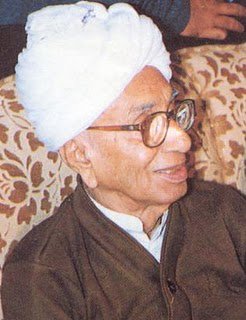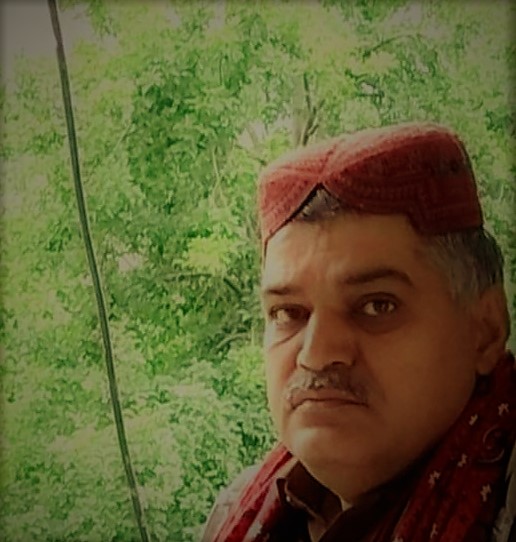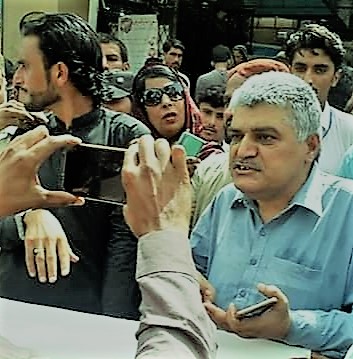
G. M. Syed’s Declaration: I am just a worker – neither Pir nor Murhsid
[Author’s Note: Will and Ariel Durant’s book – The Story of Civilization’s first volume appeared in 1935 and a complete set of eleven volumes was published in 1975. The authors took more than four decades to complete the manuscript. The readers well received the book. Therefore, their presence was sought in radio shows and press briefings. Will Durant has mentioned in one of his interviews that most common question around the globe was: ‘what is most important in human civilization, Intelligence, health or character? Will Durant responded the question that first comes the character, then health, and in the last – intelligence. I believe so, and it is still relevant in all walks of life.
I am of the view that in Sindh’s politics Mr. GM Syed, the nationalist leader and founder of Jeay Sindh Movement, was the powerhouse of ideas, and torchbearer of morality. Let me not shy, and state that he was the only politician, who practiced his ethos across the board, irrespective of political differences, power, age, class, and gender. I had been pondering over to document Jeay Sindh workers’ personal encounters with GM Syed. The present note was narrated to this scribe by Siraj Kalhoro. Mr. Siraj has been associated with Sindhi Porhyat Sangat. He has witnessed so many important events, and one of them is being presented here. This is 12th article of this series.]
Dr. Zaffar Junejo
The first general election after General Zia’s martial law was around. Interestingly, a compromise, retreat and to be accommodated also entered into politics of those days. Sadly, Pakistan Peoples’ Party untied the knot of this degenerative process. Shockingly, the process also grasped other political groups and parties in this newly created rent-seeking-behavior. In the midst of that ‘Torhi Phatak’ case prisoners were released, and most of them had crossed their student-age. Therefore, they were in a fix; it was a bit difficult for them to retain their old positions. Logically, some of them or their promoters floated an idea that all factions of ‘Jeay Sindh’ should be merged.

In the realization of that idea, on 25the December, 1990 a collective meeting was called. The invitees were Jeay Sindh Mahaz, Jeay Sindh Tahreek, Sindh Taraqi Pasand Wing and Jeay Sindh Qomparast Party. Siraj Kalhoro told this subscribe that he also attended the meeting being a delegate, as at that time he was a member of Sindhi Porhiyat Sangat, the labor wing of Jeay Sindh Mahaz, as he recalled.
Mr. Kalhoro continued: ‘soon I realized that this grand gathering was purposefully called to support Gul Muhammad Jakhrani’. According to him the body language of Torhi Phatak prisoners was too indicative that they just want senior leadership slots in Jeay Sindh Mahaz. Prior to this collective meeting, Jeay Sindh Mahaz had met separately, and it was resolved that if any type of merger happens, then it should be like the Palestine Liberation Organization (PLO).
Mr. Kalhoro stated that ‘the representatives of various groups spoke on the merger. Dr. Dodo Maheri, who represented Qadir Magsi, opposed the merger. Mir Alam Marri endorsed the idea of PLO type merger. But Muhammad Rahimoo and Gul Muhammad Jakhrani’s opinions were confused. On one hand they criticized Jeay Sindh Mahaz’s leadership, and on the other, they were unconditionally willing to be part of Jeay Sindh Mahaz, but without the democratic process.’ He elaborated that Mr. Abdul Wahid Arisar also spoke.
On certain points, directly addressing to Saeen G. M. Syed, Arisar, as quoted by Mr. Klhoro, had said, “I belong to a faraway district of Sindh, and wasn’t here as a devotee, he hasn’t that mind-bent. If I had thought like that, then there was a good number Pirs and Syeds in Tharparkar, and I might have followed Pir Aftab Shah or any other Syed or Dargah. But, I have come to Sann, because I consider you as the leader rather than Murshid, and therefore.”.
He continued that ‘Abdul Wahid Arisar’s speech created a great impact. Now workers were waiting to hear Saeen G. M. Syed’. He recalled the verbatim sentences of Saeen G. M. Syed, who said, ‘I am like a worker, and I don’t want to impose my decision; you all are free to keep your organizations’ intact’.
 Mr. Siraj said that afterwards, ‘instead of a PLO type organization, a Jeay Sindh Rahbar Committee was formed’. He concluded that ‘G. M, Syed’s speech is an example that he never imposed his decisions.’
Mr. Siraj said that afterwards, ‘instead of a PLO type organization, a Jeay Sindh Rahbar Committee was formed’. He concluded that ‘G. M, Syed’s speech is an example that he never imposed his decisions.’
[author title=”Dr. Zaffar Junejo ” image=”https://sindhcourier.com/wp-content/uploads/2021/11/Dr.-Zaffar-Junejo-Sindh-Courier.jpg”]Dr. Zaffar Junejo has a Ph.D. in History from the University of Malaya. He is freelance writer and his areas of interest are post-colonial history, social history and peasants’ history.[/author]
Click here for Part-I, Part-II, Part-III, Part-IV , Part-V, Part-VI,
Part-VII, Part-VIII, Part-IX, Part-X, Part-XI